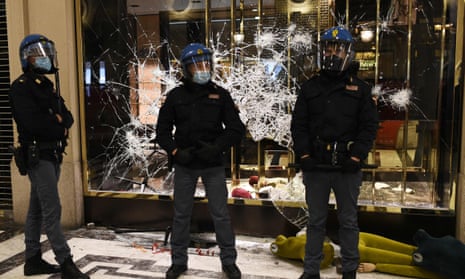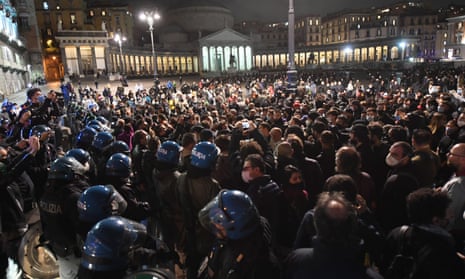We’ve launched a new blog at the link below – head there for the latest:
Belgium’s intensive care units could be overrun in a fortnight – as it happened
This blog is now closed. We’ve launched a new blog at the link below:
Mon 26 Oct 2020 19.32 EDT
First published on Sun 25 Oct 2020 20.14 EDT- Summary
- Mounting pressure on Portugal's health system could prompt further restrictions, minister says
- Czech government tightens coronavirus measures with curfew and retail curbs
- Summary
- Italians warned against travelling abroad
- Belgium’s intensive care units at risk of being overrun
- Belgium records almost 12,500 cases a day for a week
- Merkel: 'Germany on the verge of losing control of virus'
- UK health secretary says tier 4 restrictions can't be ruled out
- France may be experiencing 100,000 new Covid cases a day
- Summary
- Australia’s lockdown prevented about 400 deaths from other illnesses - research paper
- India sees lowest deaths in four months
- Restrictions eased further in Australian state of Victoria after zero new cases reported
- Mexico reports 193,170 'excess' deaths
- Malaysia's king rejects PM's proposal to declare emergency
- Israel to begin first vaccine clinical trials next month
- China reports 161 new asymptomatic cases
- Five aides to US Vice President Mike Pence test positive
- US sees new case highs
- Summary

Live feed
- Summary
- Mounting pressure on Portugal's health system could prompt further restrictions, minister says
- Czech government tightens coronavirus measures with curfew and retail curbs
- Summary
- Italians warned against travelling abroad
- Belgium’s intensive care units at risk of being overrun
- Belgium records almost 12,500 cases a day for a week
- Merkel: 'Germany on the verge of losing control of virus'
- UK health secretary says tier 4 restrictions can't be ruled out
- France may be experiencing 100,000 new Covid cases a day
- Summary
- Australia’s lockdown prevented about 400 deaths from other illnesses - research paper
- India sees lowest deaths in four months
- Restrictions eased further in Australian state of Victoria after zero new cases reported
- Mexico reports 193,170 'excess' deaths
- Malaysia's king rejects PM's proposal to declare emergency
- Israel to begin first vaccine clinical trials next month
- China reports 161 new asymptomatic cases
- Five aides to US Vice President Mike Pence test positive
- US sees new case highs
- Summary
Summary
Here’s a quick recap of all the latest coronavirus developments.
- Protests flare in Italian cities against Covid-19 restrictions. Witnesses said a number of luxury stores, including a Gucci fashion shop, were ransacked in central Turin as police responded with volleys of tear gas as they tried to restore order in the city. There were also clashes in Milan, the capital of the neighbouring Lombardy region, an area that has borne the brunt of the Covid-19 epidemic in Italy.
- Mounting pressure on Portugal’s health system could prompt further restrictions, minister says. The health minister said the country’s national health service is under grave pressure and further restrictive measures could be coming as the number of patients in intensive care approaches record levels.
- France alone may be experiencing 100,000 new coronavirus cases per day – double the latest official figures – Prof Jean-François Delfraissy, who heads the scientific council that advises the government on the pandemic, said. Tougher coronavirus containment measures could be announced in the country later this week.
- Czech government tightens coronavirus measures with curfew and retail curbs. The Czech government has ordered a 9pm curfew and will limit retail sales on Sundays, as part of tighter measures adopted to stem a surge in Covid-19 infections.
- Germany is on the verge of losing control of its fight against the coronavirus, Angela Merkel has reportedly warned colleagues. In an indication of the growing concern, Merkel brought forward a meeting on additional coronavirus restrictions with the leaders of Germany’s 16 states from Friday to Wednesday.
- Belgium’s intensive care units will be overrun in a fortnight if the rate of infection continues, a spokesman for country’s Covid-19 crisis centre has said. Dr Yves Van Laethem said the 2,000 intensive care beds would be full with patients without a change of course. On Monday morning, new regulations came into force in Brussels.
- Italians have been advised against trips to other European countries because of surging coronavirus cases, with the foreign ministry warning they could get trapped overseas if travel bans became necessary.
Protests are continuing across Italy against a new round of government coronavirus restrictions, with violence reported in at least two major northern cities, Milan and Turin.
Witnesses said a number of luxury stores, including a Gucci fashion shop, were ransacked in central Turin as crowds of youths took to the streets after nightfall, letting off huge firecrackers and lighting coloured flares.

Police responded with volleys of tear gas as they tried to restore order in the city, the capital of the wealthy Piedmont region.
There were also clashes in Milan, the capital of the neighbouring Lombardy region, an area that has borne the brunt of the Covid-19 epidemic in Italy.
“Freedom, freedom, freedom,” crowds chanted as they confronted police in the city centre.
The Italian government on Sunday ordered bars and restaurants to close by 6pm and shut public gyms, cinemas and swimming pools to try to slow a second wave of coronavirus infections.
A number of regions, including Lombardy and Piedmont, have also imposed night curfews.
Many small businesses, still badly bruised by an initial nationwide lockdown in March and April, say the new restrictions could bankrupt them.
While Italians complied peacefully to the spring lockdown, there has been an immediate pushback against the renewed restrictions.
Protesters took to the streets of up to a dozen cities on Monday, including Treviso, Trieste, Viareggio, Latina, Rome, Naples, Salerno, Palermo, Siracusa and Catania.
Looking to calm tensions, the government has said it will present a package of measures on Tuesday to support businesses hurt by the new restrictions.
Mounting pressure on Portugal's health system could prompt further restrictions, minister says
Portugal’s health minister has said the country’s national health service is under grave pressure and further restrictive measures could be coming as the number of patients in intensive care approach record levels.
“Although the Portuguese and the national health service are better prepared to respond to the pandemic than before, the situation in Portugal - as in other places - is grave,” health minister Marta Temido said.
The government “is ready to cover possible new municipalities with more restrictive measures,” she added.
Three municipalities in the country’s north went into partial lockdown last Thursday, and non-essential travel between regions was banned from 30 October to 3 November to reduce the risk of transmission during the All Saints national holiday.
A total of 1,672 people were in hospital as of Monday, with 240 in intensive care units (ICUs) - close to the peak of 271 reached in April.
The health system, which prior to the pandemic had the lowest number of critical care beds per 100,000 inhabitants in Europe, could accommodate a maximum of 800 Covid-19 patients in ICUs, Temido said.
Given current trends, over half that figure would be reached by next week, the minister cautioned.
Portugal has reported a total of 121,133 coronavirus cases and 2,343 deaths.
Recent numbers of new daily cases - reaching 3,669 on Saturday - have approached triple the country’s previous peak in April, but testing has also multiplied by around the same proportion.
The country’s toll of hospitalisations and deaths has surpassed April levels, reflecting the considerable number of new cases still being detected among higher-risk age groups, worrying health authorities.
Rising hospitalisations and deaths are not linked to increased testing.
Parliament voted on Friday for masks to be compulsory in public spaces where social distancing is difficult for a period of 70 days, a measure which will soon come into law.
Pope Francis will have to forgo meeting Catholics at the annual Advent and Christmas masses in the Vatican owing to the coronavirus pandemic, the specialist Catholic News Agency (CNA) has reported.
The 83-year-old pontiff was deprived of a congregation at Easter when he had to celebrate mass at Saint Peter’s with very few people present.
In a letter to foreign envoys to the Vatican, its foreign minister informed them that Christmas ceremonies would take “a private form” this year. Members of the diplomatic corps would not be present, and events would be made available online, a document seen by CNA said.
Tens of thousands of Catholics typically visit Rome in December to attend services at the Vatican.
The pope has scheduled a prayer on Saint Peter’s Square on 8 December in lieu of a public appearance to honour the Virgin Mary, but he is still due to celebrate mass on Christmas Eve and deliver his traditional Urbi and Orbi message to the world.
Pope Francis is fond of greeting the public, but since the Covid-19 pandemic hit Italy he has had to curtail his agenda, cancelling trips, receptions and ceremonies.
Italy has reimposed restrictions to battle a second wave of the virus, and officials face a backlash after ordering restaurants and bars to shut from 6pm and theatres, cinemas and gyms to close for a month.
The virus has killed more than 37,000 people in Italy, but thousands have also turned out in recent days to protest curbs on social activities.

Stock markets in the US and Europe fell sharply as investors focused on signs that rich countries’ efforts to contain the coronavirus pandemic were foundering.
In Europe, the Stoxx 600 index lost 1.8% after heavy falls in German blue-chip stocks. In the US the benchmark S&P 500 had lost 2.2% by the middle of afternoon trading on Wall Street and the Dow Jones industrial average fell by 2.8%.
Countries across Europe have reported increasing numbers of confirmed coronavirus cases, and governments have reimposed restrictions that are expected to limit the economic recovery from the first wave of the pandemic.
As well as new restrictions in the UK and a new six-month state of emergency in Spain, France reported a record increase in the number of confirmed cases over the weekend, while the seven-day average of new cases in the US also rose to a record.
The share prices of companies in sectors most sensitive to pandemic travel restrictions fell heavily on Monday.
Aviation and aerospace shares dragged down the FTSE 100, which lost 1.2%. The biggest fall was sustained by British Airways owner IAG, which lost 7.6%. Rolls-Royce, the engineering company whose earnings are closely tied to the number of hours its jet engines are in the air, lost 7.2%.
Czech government tightens coronavirus measures with curfew and retail curbs
The Czech government has ordered a 9pm curfew and will limit retail sales on Sundays, as part of tighter measures adopted to stem a surge in Covid-19 infections.
The curfew will be in place from 28 October to 3 November and will last until 5am each day, health minister Roman Prymula said. Exemptions include travel for work or family visits.
Retail shops still running under current restrictions must also close by 8pm and on Sundays, with exceptions including gas stations or pharmacies.
Italy’s interior ministry is on high alert over fears of violence as protests take place in major cities against coronavirus restrictions.
From Turin, Milan and Trieste in the north to Rome, Naples and Catania in the south, people have converged on squares to protest measures that include the 6pm closure of bars and restaurants and complete closure of gyms, swimmings pools, cinemas and theatres.

Episodes of tension have been reported in Turin and Naples, where people are calling for the resignation of the recently re-elected regional president, Vincenzo De Luca.
Extremist groups influenced protests in Naples and Rome over the weekend, causing clashes with police.
However, many of Monday’s protests have so far been peaceful and attended mostly by those working in sectors that will be penalised by the measures, which will be in place until 24 November.
Some doctors and nurses in Belgium who have tested positive for Covid-19 have been requested to keep working if they have no symptoms, the BBC has reported.
Several hospitals in the city of Liège have made the request as they deal with a surge in coronavirus admissions.
One of the worst affected areas in Europe, hospitals in the city have started transferring patients elsewhere and cancelled all non-urgent surgery, and the situation is exacerbated by a shortage of staff.
A quarter of medical staff in Liège are reported to be off work with Covid-19, the BBC reports, and another 10% of staff who have tested positive but are asymptomatic have been asked to continue working.
The president of the Belgian Association of Medical Unions, Dr Philippe Devos, said there is a risk of passing on the virus to patients but the hospital system could collapse within days if action is not taken.
The World Health Organization chief has warned abandoning efforts to control the coronavirus pandemic, as suggested by a top US official, was “dangerous”, urging countries not to “give up”.
Tedros Adhanom Ghebreyesus acknowledged that after months of battling Covid-19, which has claimed more than 1.1 million lives globally, a certain level of “pandemic fatigue” had set in.
“It’s tough and the fatigue is real,” Tedros said.
“But we cannot give up,” he added, urging leaders to “balance the disruption to lives and livelihoods”.
“When leaders act quickly, the virus can be suppressed.”
His comment came a day after US president Donald Trump’s chief of staff Mark Meadows told CNN that the administration’s focus had moved to mitigation, not stamping out the virus.
“We’re not going to control the pandemic. We are going to control the fact that we get vaccines, therapeutics and other mitigations,” Meadows said, comparing the more deadly Covid-19 to the seasonal flu.
Asked about Meadows’ comments, Tedros said he agreed that focusing on mitigation, and especially on protecting the vulnerable, was important.
“But giving up on control is dangerous,” he insisted.
Tedros stressed that mitigation and controlling the pandemic were “not contradictory. We can do both.”
Britain has announced wider coronavirus measures which will take the number of people under England’s highest category of restrictions to nearly 8 million.
The number of new Covid cases has risen by almost a quarter over the past week to 153,483, and new Covid deaths were 50% higher than the week before, at 1,272, taking fatalities over the course of the pandemic to 44,998, the highest in Europe.
From 0001 GMT on Tuesday Warrington in northwest England will be classified as the highest Tier 3 alert level, Britain’s health ministry said.
Local authorities in Nottingham in central England and three nearby towns said they would have similar restrictions from Thursday, the first areas outside northern England to be placed in Tier 3.
Under these curbs, people from different households are no longer allowed to socialise outdoors, adding to an existing ban on indoor socialising in much of England, while pubs and bars that do not serve food must shut.
More than seven million people across northern England, including major cities such as Manchester, Liverpool and Sheffield, are already under these restrictions.
Schools, shops and restaurants in England are allowed to stay open, unlike the first lockdown in March and April.
Other parts of the UK have imposed stricter curbs than Britain’s central government, which only has direct control over health policy in England.
Wales has shut all non-essential retailers, pubs and restaurants in a 17-day lockdown which began on Friday, and Scotland has severe curbs on hospitality across most of the country.
Pubs, restaurants and hairdressers are also closed in Northern Ireland until 13 November.